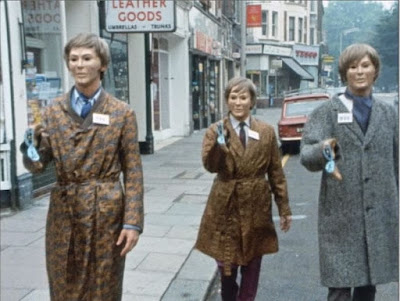When people list the great
Doctor Who producers and showrunners,
Derrick Sherwin is often overlooked because his period as producer was brief involving
just two stories. However they were hugely significant stories and his
influence on the programme was considerable. He cast both Jon Pertwee and
Caroline John, created UNIT and has also been credited with creating the Time
Lords. He rejigged the series to an Earthbound setting and also oversaw the programme’s
move from being shown in black and white to colour. Provocative, outspoken and
passionate he sounds like a difficult person to work with but his influence on Doctor Who looms large to this day.
The two stories that
Derrick Sherwin helmed are classics though he had already been a sort of
unofficial deputy producer beforehand. The epic `War Games` brought Patrick
Troughton’s tenure to a close and `Spearhead from Space` introduced Jon Pertwee. It’s important to
note that by 1969 Doctor Who’s ratings had fallen and there was talk of cancelling
the show so you could say- and Derrick Sherwin had no doubt- that he saved Doctor Who. The 1970 season was
effectively its last chance and it was Sherwin who came up with the idea of
exiling the Doctor to Earth. He totally rebooted the series moving it to a more
contemporary setting with the Doctor working to save the planet from various
alien threats. In tandem with this the series moved from a dialogue led drama
to a more action orientated one with similarities to the likes of The Avengers. Though it was Quatermass which inspired Sherwin to
take a new direction especially as he disliked adventures set in outer Space. Though
the limitations of this format quickly became clear the template was retained
and expanded upon by Sherwin’s successor Barry Letts. It is tempting to imagine
how the series would have fared had Sherwin not left so soon. While much of ` War
Games` sticks to the well- established second Doctor palette it is `Spearhead`
where Sherwin’s vision for Doctor Who
is unveiled and it has more in common with the modern series than it does with
late 60s one..
In a 2009 interview he
described the somewhat chaotic situation behind the scenes at the time also
giving an insight into his approach: “I was landed with a great pile of
scripts that had to go into production immediately after the holiday break. The
director had sent them back and said he wouldn’t do them. Pat Troughton had
thrown a wobbly – they really were appalling! So I spent the entire Christmas,
apart from Christmas Day, rewriting the first two of three episodes of that
story, to get it into some sort of reasonable shape. I found Mervyn Haisman and
Henry Lincoln (writers of ‘The Dominators’) tough guys to work with. They were
aggressive writers, insofar as they were very difficult to convince that they
had made a wrong move if something needed adjusting or a piece of dialogue
needed changing. They fought for every dot and comma.”
Derrick Sherwin did his
National Service in the Royal Air Force before launching his creative career.
He began working as an artist and stage manager in the theatre. On television he
worked across disciplines in the Fifties and Sixties as a writer, actor and
producer. Acting roles included appearances in series such as Sunday Night Theatre, William Tell, Here Lies Miss Sabry, Danger Man, Richard the Lionheart and Edgar
Wallace Mystery Theatre. He wrote or script edited the series United (1967-68) as well as writing an
episode of Emergency Ward 10 and two
episodes of Z Cars. It was little
known at the time that he also penned the first episode of The Mind Robber as a
story editor on Doctor Who. In 1968 he
wrote `Invasion` one of the best remembered stories which introduced
UNIT and soon after he became producer of the series. However he was taken off Doctor Who to produce a show being
co-produced with Germany, Paul Temple,
which ran for 37 episodes from 1970-71 after which he produced the less well
known The Man Inside.
Other production credits
are Ski Boy (1973) and Perils of Pendragon (1974). He set up an
independent production company SkyBoy in 1974 and continued writing mainly for
children’s dramas Kin and Co and Nobody’s House (both 1976). Some
biographies say that in the early 1980s he was running the world’s first
computer animation company Electronic Arts but there is no evidence of this
in histories of the company which was founded in the US. Later he abandoned the arts altogether and
after divorcing moved to Thailand where he earned a living in the tourist industry.
Latterly he often seemed snippy
about Doctor Who despite twice making
a serious bid to produce the series during the 1990s when it was off the air
and calling his memoir `Who’s Next`. The book was by his own admission
cynically released to cash in on the fiftieth anniversary of the show which he
said he was “pissed off” not be involved in. The book pulls no punches
describing his difficult working relationship with Patrick Troughton (whom he claims
was suffering from stress) as well as having less than kind words for Peter
Bryant. Sadly the text also betrays him to be a man from another time with some
of the prejudice and attitudes that suggests. He was dismissive of the 2005
revival which he called “bullshit”. Indeed later interviews he gave seemed to
find him angry about most things. Perhaps what it all boils down to is that he hadn’t
really wanted to be taken off the series in 1970 when he’d hardly got
started.



No comments:
Post a Comment
Note: only a member of this blog may post a comment.